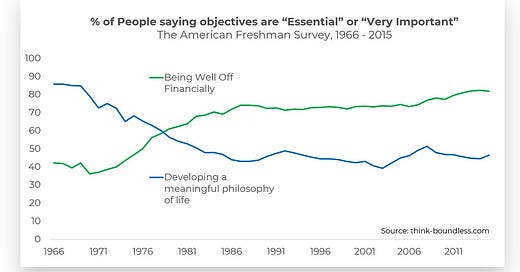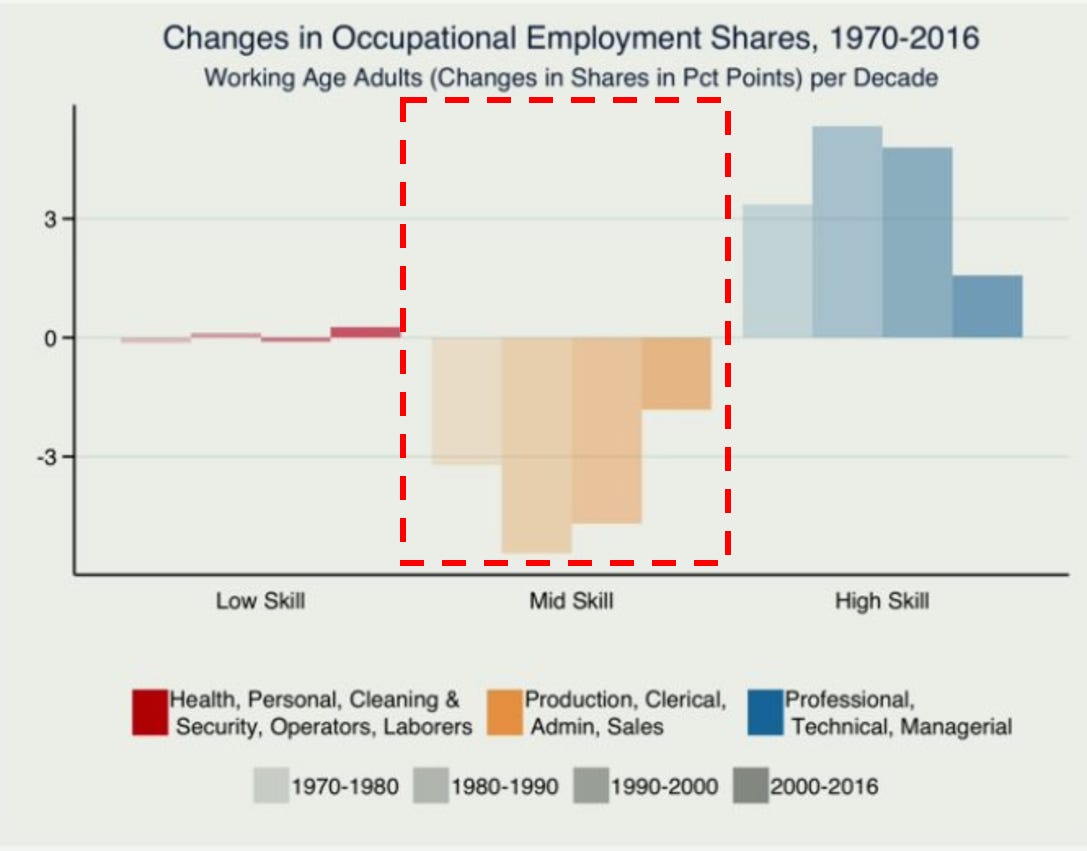#121: Do you have a meaningful philosophy of life?
🥥 Also viral threadapalooza, creator economy & more
December 19th, 2020: Greetings from Puerto Escondido to 136 new people who joined this week mostly from an off-the-cuff 100-tweet thread I put together on the state of work. Special thanks to Lane, Austin, Matt, Amot, Anand, Ian and “Jamram” for becoming paid subscribers of the newsletter. Always a great boost to keep going.
We stumbled upon a cliff walk this week that we didn’t know was 5 minutes from our apartment.
Stumbling on this from the web? Subscribe here and join 2,987 other smart people.
#1 Why did students abandon philosophy?
I shared tidbits of this data before but wanted to write it up more fully. The full essay is on my site here if you’d like to bookmark.
Since 1966 UCLA has been conducting a survey called “The American Freshman” which has surveyed incoming college students on a range of factors.
A review of the first 30 years of the data in 1996 highlighted a fascinating shift in values.
Especially notable are changes in two contrasting value statements: The importance of “developing a meaningful philosophy of life” and of “being very well off financially” In the late 1960s developing a meaningful philosophy of life was the top value, being endorsed as an “essential” or “very important” goal by more than 80 percent of the entering freshmen. Being very well off financially, on the other hand, lagged far behind in the late 1960s, ranking fifth or sixth on the list with less than 45 percent of the freshmen endorsing it as a very important or essential goal in life. Since that time these two values have basically traded places, with being very well off financially now the top value (at 73.6 percent endorsement) and developing a meaningful philosophy of life now occupying sixth place at only 43.1 percent endorsement
You can see a visual representation of this swap in the following graph.
While “developing a meaningful philosophy of life” seemed to drop steadily from survey launch, the goal of being well off financially didn’t seem to take off until the early 1970s.
The other interested thing from this long-term data is how consistent the other values have been. I looked at the top 4 values from 1970 – 2015 and found that despite the two above mentioned values changing place, the other three values remained remarkably consistent.
Those three things?
Raising a family
Helping others who are in difficulty
Becoming an authority in my field
Essentially, take care of the people in your life, try to help others and be good at what you do.
These seem like a good recipe for like and aligns with the wisdom and research on what leads to a meaningful life.
But still, why did college students become so obsessed with money and why has it remained so central?
But What Does Society Want?
To explore that question it might be worth considering that around this time mass media culture was emerging and people were beginning to ask “what does society want.”
Of course there is no society and it has no demands but the pressure we feel to do specific things is real.
The funny thing is when you ask people their own preferences they are remarkably different than what they think society “wants.”
This happened in Gallup’s Success Index in which they asked people two questions:
How do you personally define success?
How do you think others define success?
Take a look at the main section of this on status:
Almost everyone thinks success is about being good at something you care about while at they same time they think that almost everybody else only cares about being rich and famous.
How can this be?
Either most people are lying about how they define success or people have a terrible understanding of the motives of other people.
My guess would be that it is a bit of both. It’s very easy to delude ourselves into thinking we are doing things for the right reasons while assuming that others are in it for the wrong reasons.
What I think this survey tells us is that even if people do have good motivations for doing whatever they are doing, they feel that they will be judged by a different societal standard.
A different section of the survey shows this in an even more dramatic way. It asked people to rank 76 different elements that are part of their personal definition of success. Similar to the survey with college freshman we see that having a family is an important part of people’s lives.
However, when you ask the same people about their perception of broad societal definitions of success we see the lowest ranked value from above jump all the way to #1 and to a dramatic degree.
It seems that most people assume there is a broad societal benchmark of “success” that mostly has to do with how much money, status and fame one has. Despite this, most people also seem to proclaim very different definitions of success.
#2 New Options Emerging
Citibank unveiled new perks for its employees. Including:
Ability to “purchase” 5 extra vacation days
Ability to work pro bono for four weeks at 100% base pay
12 week sabbatical after 5 years at 25% pay
This is encouraging and appears to be the first signs beyond remote work benefits that companies have woken up over the last year. I personally think the pro-bono opportunity is incredible. I definitely would use that one. Even better if you could use it to spend time with a family member in need.
#3 The Creator Economy (probably) won’t have a middle class
This essay in HBR, titled “The Creator Economy Needs a Middle Class” started off okay, outlining some of the dynamics of why there is not a middle class in the tech economy (superstar companies, superstar wages) which are well documented, especially over the last 10 years.
But then the solutions seemed a little off. They were of ideas to redistribute wealth that seemed to deny the reality that:
Likely everyone is not going to be a “creator”
The “middle class” was likely more of a circumstance of accidental economic and political history and many of the “middle-skill” jobs in large companies today have either been outsourced, no longer exist or won’t exist once that person retires.
David Autor, an MIT economist who has produced some of the most interesting research on the labor economy has detailed the death of “middle-skill” jobs:
There were these occupations where non-college workers did skilled work in metro areas: production work and clerical, administrative work. These were middle-skill jobs and they were much more prevalent in cities, urban areas, and metro areas than they were in suburbs and rural areas. But that began to decline in the 1970s and is now extinct. There’s nothing remaining of that.
I don’t think the “middle-class” as we conceived of it is coming back.
At the end she details ideas of a “universal creative income” and more support for education and training. I definitely think these are worth exploring in a deeper way. Our current system does not nudge the average person to take risks and start things. I’d definitely be in favor of shifting some of the trillions we invest in higher education and investing broadly in individual people without being too attached to needing an outcome.
The government doesn’t track the success of schools it gives money to anyway, right?
#4 Tweet Thread
I explored an off-the-cuff tweet thread that seemed to go semi-viral this week. As always with this kind of thing, people engaged in a bit of mind reading of what I thought and took some things out of context. Hopefully all of you that joined me here are looking forward to exploring a number of those things in a deeper way.

These ideas range from very strongly believe to very much less so. However, I hope it made people think and I was excited that it has led to a lot of productive discussions with business owners who are rethinking a lot of this stuff after 2020.
#5 Cool Opportunity For Students
I’ll be announcing a small scholarship thing I’m getting involved in soon, but this seems like a great opportunity for students:


That’s all this week. If you’d like to share this post or forward to a friend I’d appreciate it. If you want to dive deeper you can explore some of my writing here.












Great issue